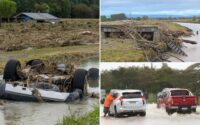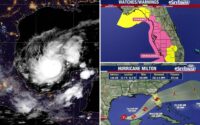Scientist Mark Dickey sends video message while trapped in Turkish cave
The experienced American cave researcher trapped in Turkey’s third-deepest cave after falling dangerously ill delivers a video message from over 3,000 feet below the earth as rescuers race to bring him back to the surface.
“The caving world is a really tight-knit group and it’s amazing to see how many people have responded on the surface,” Speleologist Mark Dickey said in the video shared by Turkey’s communications directorate on Thursday.
Dickey, 40, became ill from gastrointestinal bleeding Saturday while exploring the Morca cave in southern Turkey’s Taurus Mountains and said the “quick response” by the Turkish government to send him down medical supplies “saved” his life.
“I was very close to the edge,” said Dickey, the chief of the Sussex County-based New Jersey Initial Response Team.
Delivering his thankful message on his feet, the Croton-on-Hudson resident said he was still not “healed on the inside” but was staying alert as he waited for help.


The scientist shared that “communication” between himself and the rescuers above is taking “a day or two” to “get back and forth.”
Communication between ground-level rescuers and Dickey’s location has stalled due to phone lines set up in the caves having become inoperable — with communication being relayed by experienced cavers that take roughly eight hours each way.
Doctors taking part in the international rescue operation will decide if he’ll need to be taken out by a stretcher or if he can exit on his own.

“The operation is logistically and technically one of the largest cave rescues in the world,” the caving federation said in a statement.
The temperature in the area where Dickey is stuck fluctuates between 39 to 42 degrees, The New Jersey Initial Response Team said.
Due to the cave’s narrow passages, it will be a challenge in itself just to run the stretcher lines required to save Dickey, according to Yusuf Ogrenecek of the Speleological Federation of Turkey.
It could take anywhere from several days to three weeks to safely hoist Dickey out of his current location, depending on the situation, Ogrenecek revealed.

Several bivouac points are being prepared so that Dickey and rescue teams can rest during their return.
The rescue teams hope the extraction will begin this Saturday or Sunday.
Passages within the cave are being widened for safer extraction, and the danger of falling rocks due to the work is also a concern being addressed by rescuers.
Rescuers are not only worried about the physical toll that Dickey will have to endure when rescued but also what being trapped inside the caves for an extended period may have on him psychologically as he patiently waits to return to the surface.

Because of his condition and the temperature of the cave, Dickey has been unable to climb out of the cavern on his own, the European Cave Rescue Association said on its website, explaining that Dickey himself is “a highly trained caver and a cave rescuer himself.”
Initially growing ill on Sept. 2, it took until the morning of Sept. 3 to notify others above ground of his worsening condition.
Dickey has since stopped vomiting after he was bleeding and losing fluid from his stomach, and the explorer has eaten for the first time in days, according to a New Jersey-based cave rescue group.

The Hungarian Cave Rescue Service was the first to deliver a life-saving blood transfusion to stabilize his condition.
It remains unclear what caused him to suffer the severe stomach illness.
Rescue personnel totaling 170 from Bulgaria, Croatia, Hungary, Italy, Poland, and Turkey are participating in the operation.

Each country’s rescue team is responsible for one of the cave’s several sections as they attempt to pull off the changeling rescue.
Dickey, a veteran instructor with the National Cave Rescue Commission, was co-leading an expedition to find and map a new passage in the 4,186-feet-deep Morca cave system for the Anatolian Speleology Group Association when he fell ill at a depth of around 3,674 feet before being moved to the group’s base camp.
Andrew and Deborah Ann Dickey, the scientist’s parents, released a statement thanking rescuers for their life-saving efforts.
“Mark is strong, but he needed his fellow cavers, including, of course, the doctors, to allow a devastatingly scary situation to turn positive,” Dickey’s parents said.
“Our prayers are being answered and we cannot express how much that means, and will always mean, to us.”
With Post wires.


